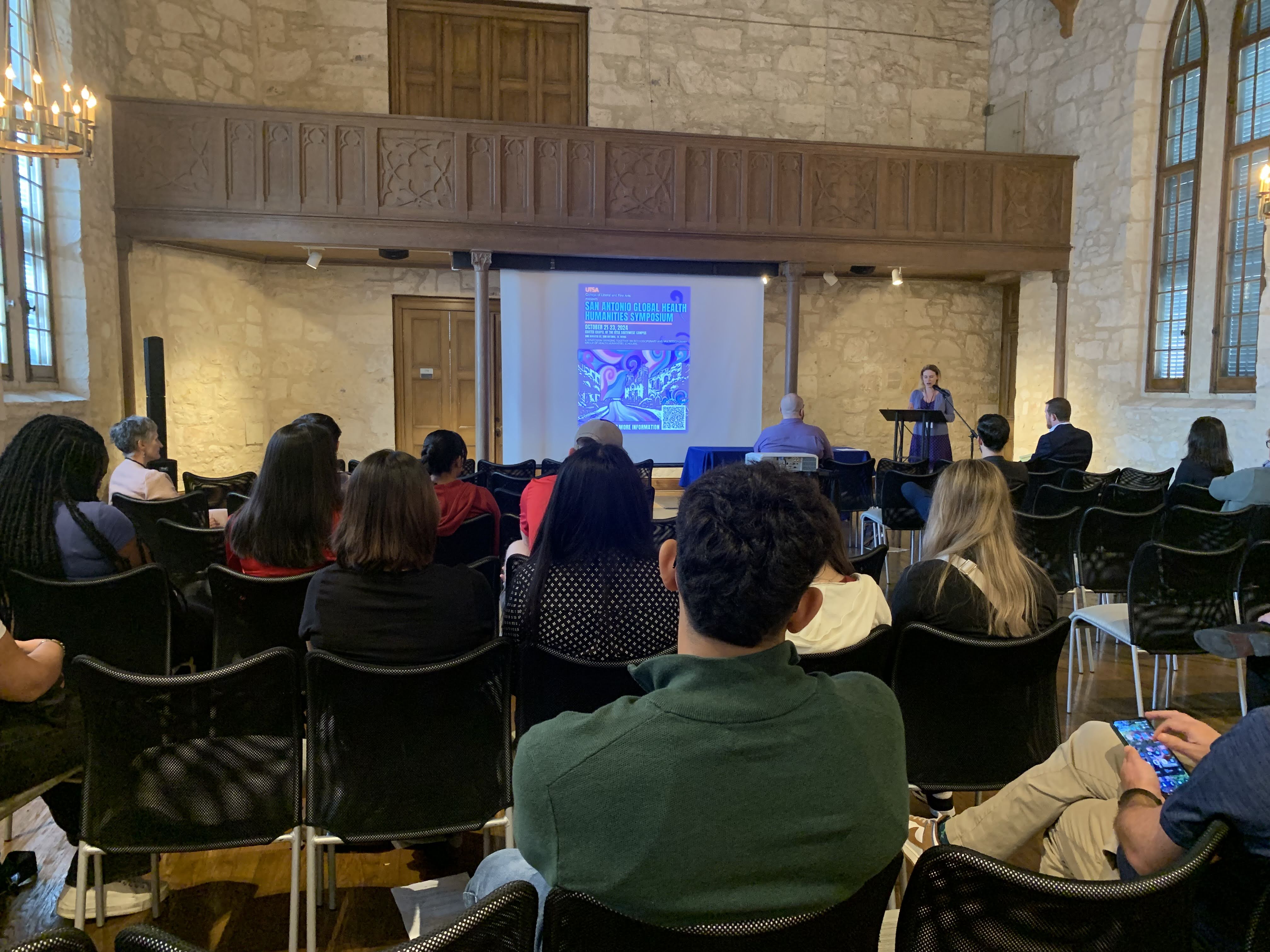Posted on November 1, 2024 by Nick Ward

Guests gathered for the symposium
November 1, 2024 - UTSA’s College of Liberal and Fine Arts and the Interdisciplinary School for Engagement hosted the university’s first Global Health Humanities Symposium from October 21st through the 23rd as part of the school’s Medical Humanities program.
This symposium brought together an interdisciplinary and multidisciplinary group of health humanities scholars at different career stages (e.g., professors, students, and undergraduate researchers), in addition to local health professionals, who shared their work in an effort to help establish a wider, more interconnected community for the health humanities in San Antonio.
Professionals from a variety of educational institutions attended, highlighting UTSA’s collaborative approach to global health issues. Attendees from San Antonio included experts from UTSA, University of the Incarnate Word, Texas A&M University - San Antonio, St. Mary’s University, , and UT Health San Antonio, with which UTSA will soon merge. A number of international institutions also took part including University of Nebraska – Lincoln, Gettysburg College, University of Houston and more.
Presentations at the symposium covered a wide array of pressing topics in health and the humanities. Experts discussed racial and health disparities, ethical challenges in patient care, and the impact of media on public perceptions of health issues. Sessions delved into innovative educational strategies, such as internationalizing medical interpreting curricula, and explored the therapeutic role of the arts in health. Historical perspectives were also highlighted, with discussions on medieval conceptions of community health and examinations of how historical narratives shape modern understandings of health and identity.
The symposium additionally prompted UTSA Medical Humanities students to share their own research. This multidisciplinary experience has enhanced understanding of the intersection between history, health, and humanities for the students. Students went on to present their findings and insights at the International Health Humanities Symposium at UTSA.
"Involving Medical Humanities students in this symposium allowed them to engage directly in discussions shaping the future of healthcare," said Melissa Wallace, associate professor of translation and interpreting studies. "This experience encourages our students to approach complex health issues with a broader, human-centered perspective, supporting their growth as thoughtful leaders in the field."
The Bachelor of Arts in medical humanities offers a unique education that stands at the intersection of medicine, health care and the humanities and encompasses fields such as history, literature, philosophy, ethics, medical interpreting, and the arts. The degree cultivates a holistic view of health care, moving beyond the scientific dimensions to deeply understand thesocial, cultural and ethical facets of medicine.
In line with this commitment to the humanities in healthcare and with an eye to internationalizing the curriculum, this past summer, Medical Humanities and healthcare interpreting students, under the guidance of associate professor Melissa Wallace, immersed students in the historical and cultural landscape of Spain, beginning with an examination of the Spanish Civil War and the recovery of historical memory. Through visits to key sites like Alicante’s Civil War Interpretation Center and air raid shelters, students explored the societal impacts of war and dictatorship, learning about Spanish history and culture as a backdrop to four weeks of close collaboration with scholars and clinicians from the medical school of the Universidad Miguel Hernández. In this intense immersion experience, students studied public health, preventative medicine, hospital administration, and gastronomy in Spain, taking a deep dive into issues of technology, access, and the provision of care across systems and borders.
Efforts such as these to internationalize Medical Humanities at UTSA harmonize with the mission of the UTSA Global Health Humanities Symposium. "This symposium has been an incredible opportunity to bring together international experts in health humanities, enabling meaningful exchanges that deepen our understanding of complex health issues that impact the global community," said Kirsten Gardner, Romo Endowed professor of the Honors College and director of the UTSA Medical Humanities program. "UTSA is honored to serve as a hub for these critical conversations, and we look forward to the prospect of hosting this conference again in the future to continue building on this impactful work."

